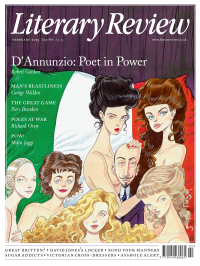Ariane Bankes
Front Lines
David Jones in the Great War
By Thomas Dilworth
Enitharmon Press 228pp £15
When the artist David Jones’s book-length meditation on the Great War, In Parenthesis, was published in 1937 by Faber, it established him immediately as one of the most singular poets of the day. T S Eliot, who championed Jones at Faber, was delighted to discover in this ‘work of genius’ an entirely original voice, one that combined a startling modernism with a sensibility drenched in myth and history. The 40,000-word epic of prose and verse that reimagined Jones’s experiences as a private at the Western Front with extraordinary immediacy and depth was garlanded with praise, winning the Hawthornden Prize in 1938, then the only literary prize worth winning.
By the late 1920s David Jones was already considered England’s foremost engraver and an artist of note: Ben Nicholson set about recruiting him for the Seven and Five Society (members included Nicholson’s wife Winifred, Christopher Wood and Barbara Hepworth), and he was starting to exhibit with success in London’s major

Sign Up to our newsletter
Receive free articles, highlights from the archive, news, details of prizes, and much more.@Lit_Review
Follow Literary Review on Twitter
Twitter Feed
It wasn’t until 1825 that Pepys’s diary became available for the first time. How it was eventually decrypted and published is a story of subterfuge and duplicity.
Kate Loveman tells the tale.
Kate Loveman - Publishing Pepys
Kate Loveman: Publishing Pepys
literaryreview.co.uk
Arthur Christopher Benson was a pillar of the Edwardian establishment. He was supremely well connected. As his newly published diaries reveal, he was also riotously indiscreet.
Piers Brendon compares Benson’s journals to others from the 20th century.
Piers Brendon - Land of Dopes & Tories
Piers Brendon: Land of Dopes & Tories - The Benson Diaries: Selections from the Diary of Arthur Christopher Benson by Eamon Duffy & Ronald Hyam (edd)
literaryreview.co.uk
Of the siblings Gwen and Augustus John, it is Augustus who has commanded most attention from collectors and connoisseurs.
Was he really the finer artist, asks Tanya Harrod, or is it time Gwen emerged from her brother’s shadow?
Tanya Harrod - Cut from the Same Canvas
Tanya Harrod: Cut from the Same Canvas - Artists, Siblings, Visionaries: The Lives and Loves of Gwen and Augustus John by Judith Mackrell
literaryreview.co.uk